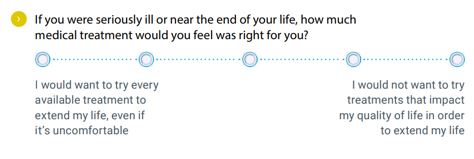At The Conversation Project, we talk a lot about the importance of sharing what matters to you — in your life and in your health care. Many of the people we talk with know this is important to do, and they aren’t quite sure where to begin. That’s why we created the Conversation Starter Guide, which has lots of examples and ideas. These conversations don’t need to cover specific medical issues. Instead, they can focus on what matters to you. Often that is easier to talk about. Plus, the answers can be helpful for all different situations, including unexpected future health questions.
One part of the Conversation Starter Guide that’s been really popular is our scale questions, which include examples of different answers. Here’s one of them:

We can’t plan for everything, and sometimes it’s hard to know how to answer questions like these. You can start by thinking about what is important to you, in your life and in your health care. The answers look different for each person.
Here are four examples of how individuals have answered this question, in case someday a trusted person needs to make health care decisions on their behalf:
It depends on the prognosis:
“If I could emotionally and intellectually parent our children — I’m in. If I could connect with our kids and help them with the challenges they are going through in their life, I’d want to pursue all forms of treatment available even if it meant physical limitations. However, if I couldn’t connect with them emotionally or intellectually, I wouldn’t want you to take extreme measures to save my life.” —A mom of teenagers, sharing with her spouse
I want others to decide for me:
“In looking through the Conversation Starter Guide, I can see that some people might have strong opinions about what matters to them. But for me, I just want my adult children to decide based on the circumstances at the time. I realize THAT is the conversation I want to have with them. That they should do whatever makes them feel most comfortable. I don’t want to leave them in the lurch thinking, ‘We don’t know what to do, Mom never told us what she wanted.’ I’m not trying to avoid answering questions or being open with them.” —A participant in an event held by The Conversation Project in Las Vegas, NV.
I just want to be comfortable:
“Well, if I’m able to eat chocolate ice cream and watch football on TV, then I’m willing to stay alive…I’m willing to go through a lot of pain if I have a shot at that.” Jack Block, talking with his adult daughter, as quoted in Being Mortal by Dr. Atul Gawande
I have very specific wishes in mind:
“If you’re reading this because I can’t make my own medical decisions due to dementia, please understand I don’t wish to prolong my living or dying, even if I seem relatively happy and content. …So please let my wishes as stated below guide you…
- I wish to remove all barriers to a peaceful and timely death.
- Please ask my medical team to provide Comfort Care Only.
- Try to qualify me for hospice.
…
- If I’m eating, let me eat what I want, and don’t put me on “thickened liquids,” even if this increases my risk of pneumonia.
- Do not force or coax me to eat.
…
- If I must be institutionalized, please do your best to find a place with an art workshop and access to nature, if I can still enjoy them.” —Katy Butler, in a detailed letter to a future decision maker.
You can see that there’s no right or wrong answer to what matters most to you, or what type of treatment you may or may not want. The most important thing is to talk about it in a way that helps others understand how to approach decisions if they are in a situation where they might need to make decisions on your behalf. (There’s more information about figuring out who would speak for you if necessary, and about being the person who speaks for someone else, in our guides for Choosing a Health Care Proxy and Being a Health Care Proxy.)
Have you had this conversation with someone who might need to make medical decisions on your behalf one day? What advice do you have for others having these conversations? Share in the comments below.


この度は、貴重な終末医療の最新情報の提供誠にありがとうございます。
私は来年75歳、独り暮らし早期肺癌にて3年半前に胸腔鏡下の外科的手術を受け、胸部外科にて6ヶ月検診中です。幸い再発や術後後遺症なく経過良好ですが、再発リスク問題を抱えています。
自分の終末医療を見据えて、自らの死生観を明文化し看取られたいと、改めて痛感しています。
急変事態を予測し周囲の人々への負担を最小限にするべく、自らの最適な看取りの心の準備に備える貴重なヒントを与えていただきました。
具体的な行動計画の視点イメージを意識し、今すべき事柄にフォーカスしてセルフイメージの明確化に繋いでいきたいと考えています。
貴重な学習の機会を与えていただき、ありがとうございました。